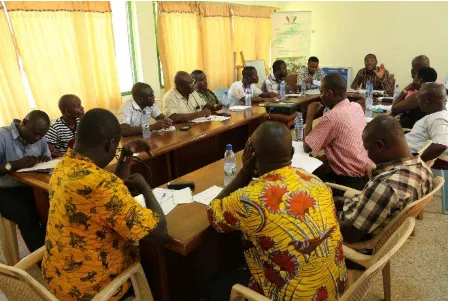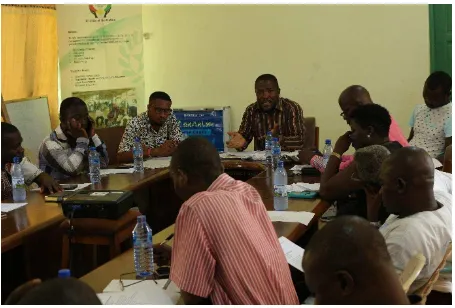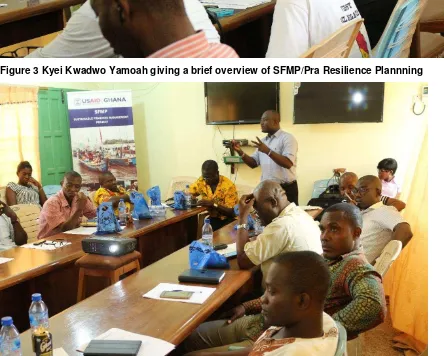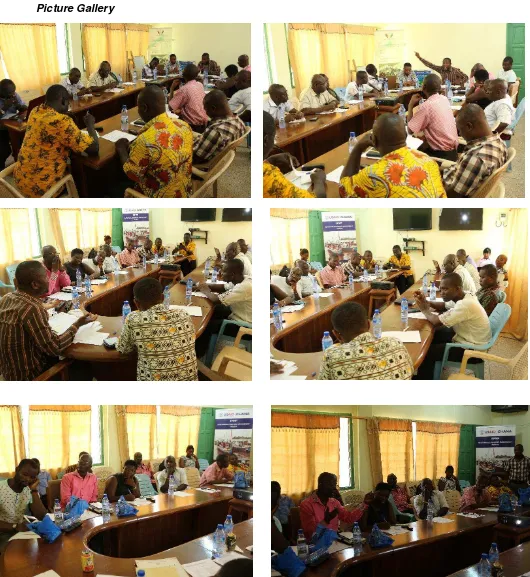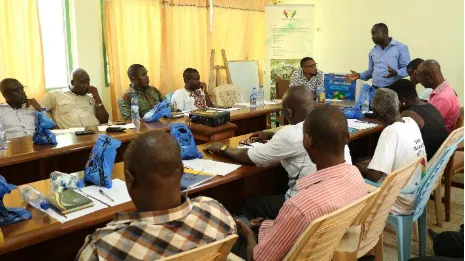SUSTAINABLE FISHERIES
MANAGEMENT PROJECT (SFMP)
SWOT Analysis Workshop For
Shama District Agriculture and
Coastal
Management
Sub-Committee
This publication is available electronically on the Coastal Resources Center’s website at http://www.crc.uri.edu/projects_page/ghanasfmp/
For more information on the Ghana Sustainable Fisheries Management Project, contact:
USAID/Ghana Sustainable Fisheries Management Project Coastal Resources Center
Graduate School of Oceanography University of Rhode Island
220 South Ferry Rd.
Narragansett, RI 02882 USA
Tel: 401-874-6224 Fax: 401-874-6920 Email: [email protected]
Citation: Friends of the Nation (2015). SWOT Analysis workshop for Shama District Agriculture and Coastal Sub-committee. The USAID/Ghana Sustainable Fisheries Management Project (SFMP). Narragansett, RI: Coastal Resources Center, Graduate School of Oceanography, University of Rhode Island. GH2014_POL015_FoN. 17 pp.
Authority/Disclaimer:
Prepared for USAID/Ghana under Cooperative Agreement (AID-641-A-15-00001) awarded on October 22, 2014 to the University of Rhode Island and entitled; the USAID/Ghana Sustainable Fisheries Management Project (SFMP).
This document is made possible by the support of the American People through the United States Agency for International Development (USAID). The views expressed and opinions contained in this report are those of the SFMP team and are not intended as statements of policy of either USAID or the cooperating organizations. As such, the contents of this report are the sole responsibility of the SFMP Project team and do not necessarily reflect the views of USAID or the United States Government.
Detailed Partner Contact Information:
USAID/Ghana Sustainable Fisheries Management Project (SFMP) 10 Obodai St., Mempeasem, East Legon, Accra, Ghana
Telephone: +233 0302 542497 Fax: +233 0302 542498
Maurice Knight Chief of Party [email protected]
Kofi Agbogah Senior Fisheries Advisor [email protected] Nii Odenkey Abbey Communications Officer [email protected]
Bakari Nyari Monitoring and Evaluation Specialist [email protected] Brian Crawford Project Manager, CRC [email protected]
Justice Odoi USAID Administrative Officer Representative [email protected]
Kofi.Agbogah
SNV Netherlands Development Organisation #161, 10 Maseru Road,
E. Legon, Accra, Ghana 233 30 701 2440
Donkris Mevuta Kyei Yamoah [email protected] Friends of the Nation Parks and Gardens Adiembra-Sekondi, Ghana 233 312 046 180
Peter Owusu Donkor Spatial Solutions
[email protected] #3 Third Nautical Close,
Nungua, Accra, Ghana
Darkuman Junction, Kaneshie Odokor Highway
Accra, Ghana 233 302 315894
Gifty Asmah
[email protected] Daasgift Quality Foundation
Headmaster residence, Sekondi College Sekondi, Western Region, Ghana 233 243 326 178
For additional information on partner activities:
CRC/URI: http://www.crc.uri.edu CEWEFIA: http://cewefia.weebly.com/
DAA: http://womenthrive.org/development-action-association-daa Daasgift:
https://www.facebook.com/pages/Daasgift-Quality-Foundation-FNGO/135372649846101 Friends of the Nation: http://www.fonghana.org Hen Mpoano: http://www.henmpoano.org
SNV: http://www.snvworld.org/en/countries/ghana SSG Advisors: http://ssg-advisors.com/
ACRONYMS
ACRMSC Agriculture and Coastal Resource Management Sub-Committee ASNAP Agribusiness in Sustainable Natural Africa Plant Product B-BOVID Building Business on Values, Intergrity and Dignity CSO Civil Society Organisation
FoN Friends of the Nation
GNCFC Ghana National Canoe Fishermen Council KVIP Kumasi ventilated improved pit latrine NGO Non-Governmental Organisation
NADMO National Disaster Management Organisation SFMP Sustainable Fisheries Management Project SWOT Strength Weakness Opportunity Threat SDA Shama District Assembly
ToR Terms of Reference
TABLE OF CONTENTS
ACRONYMS ... iii
TABLE OF CONTENTS ... 1
LIST OF FIGURES ... 1
LIST OF TABLES ... 1
INTRODUCTION ... 2
METHODOLOGY ... 2
DETAILED SESSION... 2
SUMMARY OF DISCUSSIONS AND KEY ISSUES FROM THE MEETING ... 3
Brief Report from the Environmental Department Head ... 3
Questions/Comments/Responses/Recommendations. ... 3
Brief Report by Mr Joseph N. T.Otu, the Head of Agriculture Department ... 4
Questions/Comments/Responses/Recommendation. ... 5
Brief Report by Mr. Hughes Ametefe, NADMO Head. ... 5
Questions/Comments/Responses/Recommendation. ... 5
OPEN DISCUSSION... 6
SWOT ANALYSIS ... 6
Goal ... 8
Mandate... 8
Terms of Reference ... 8
CLOSING REMARKS ... 9 Figure 1 Picture of cross-section participants at the Agriculture Coastal Resources Management Sub-Committee. ... 3
Figure 2 Chairman of the Committee addressing the house. ... 6
Figure 3 Kyei Kwadwo Yamoah giving a brief overview of SFMP/Pra Resilience Plannning 7 Figure 4 Theophilus Boachie-Yiadom facilitating the SWOT Analysis ... 7
Figure 5 Pictures from the Workshop ... 11
Figure 6 Participants at the Workshop ... 12
INTRODUCTION
As part of the USAID/GHANA SFMP which seeks to ensure the rebuilding of marine fisheries stocks and catches, the project has selected Pra Estuary as one of the two areas for the development of mangrove ecosystem and fisheries management plans. In order to certify proper development of these fisheries and mangroves management plans, the project seeks to ensure that communities encompassing the Pra Estuarine area are more resilient to
vulnerabilities such as flooding.
There has been already activities which has been undertaken to help prepare the Pra Resilience Planning. In the scoping and literature review, there were some essential information identified. And in that was a SWOT Analysis to be conducted of key local institutions identified during the scoping and literature review and this will help develop and build capacity building initiative for these local institutions.
In view of this, Friends of the Nation organized a SWOT Analysis workshop with the Agriculture and Coastal Resource Management Sub-Committee which was one of the local institutions in the Shama District identified during the scoping and literature review. The workshop took place at the Conference Room of the Shama District Assembly on April 19, 2016 around 10:12 am.
METHODOLOGY
The workshop adopted an open discussions method which was related to the activities of the Agricultureulture and Coastal Resource Management Sub-Committee.
DETAILED SESSION
Prior to the discussions of the SWOT Analysis, the Agriculture and Coastal Resource
Figure 1 Picture of cross-section participants at the Agriculture Coastal Resources Management Sub-Committee.
SUMMARY OF DISCUSSIONS AND KEY ISSUES FROM THE MEETING
Brief Report from the Environmental Department Head
Mr. Mensah gave a brief report on the activities of the department from their last meeting up to date. In his submission, he talked about sanitation along our beaches. The first place for sanitation day started at Aboadze. But the sanitation at the beaches has become worse due to attitudinal problems we are facing from community members. So we currently have secured some vehicles and we will do education along the coastal stretch. This is because the judges usually ask if the people have been educated then we can arrest people. I would plead that when people are arrested relatives don’t come in to intervene. If there is to be any
intervention it should be done before it is taken to court. And we are in the rainy season and usually cholera is prevalent during this season. The public education will start in the first week of May.
Questions/Comments/Responses/Recommendations.
Hon. Emmanuel Mark Ackon quizzed, how is the education going to be done? Which people are going to be educated, those who do open defecation or those who throw rubbish at the beaches? And besides, there is only one toilet facility in my community which is inadequate.
The head responded that aim of this sensitisation is to keep the coast clean so it is to cover the two issues.
Another member pleaded that the second Kumasi improved ventilated pit latrine (KVIP) should be completed early so that they can use it else the people will still have no option. It will not be laudable at the court to arrest people when there are no community toilets.
that governments should build toilets in their communities. Individuals should have toilets in their houses.
The Head agreed but he added that the nature of some of the houses and the layouts of the communities is such that it will be difficult to make provision for toilet facilities and dislodging will even be difficult.
Chairman asked whether there are no laws to check open defecation and does your outfit ensure that building plans make provision for toilet facilities?
Mr Mensah responded that there are laws, but the core of the problem is attitudinal of people that is why we want to do the education to enlighten them. The assembly members also ought to help to ensure sanitation at the coast. The Head of Department responded yes, we look out for these things in the building plan before permits are given. But Timothy Ayensu chipped in that the Statutory Committee and Technical Committee go through the building permit and building plans for reviews before the approvals are given. But the problems are with the general public who are playing reluctant to submit their building permit making the enforcement difficult. Instead, they start building while they have acquired a land. So it is an attitudinal problem with the general public. What we need to do is to educate the people continuously on these policies. The assembly should do more education on these issues and let them know how dangerous it is to build without an approved building permit from the assembly.
Jeffrey Scott also added that there is a committee whose core mandate is to check these issues. I would urge that these issues be forwarded to them so that they can look into it. But education is also very important. We cannot always go by ignorance of the law is no excuse. People need to be enlightened then we can effectively enforce the law.
The Chairman later went ahead and recommended that the committees responsible for such issues ensure that the right things are done. Education should be done but the various departments should also be diligent.
Brief Report by Mr Joseph N. T.Otu, the Head of Agriculture Department
Mr Out briefed the house about the ongoing farmer registration to obtain a data base. This excludes fishermen. This is to promote small ruminants farming, that is goats and sheep. We started with 6 farmers. Per farmer, 5 females and one male sheep was given. But the animals were struck with pneumonia so we lost most of them. We currently have only 13 surviving. Also, there is an ongoing Greenhouse Technology Project. Shama District is the only district to 5 kits with one located at the Shama Senior High School. The programme is for peri-urban communities and it is not to replace the traditional method of farming. This is an intervention because of the lack of land for farming. The challenge is to acquire more the kit to because it is expensive.
Questions/Comments/Responses/Recommendation.
Emmanuel Ackon asked whether farmers go to the office for registration or the officials go to the farmers in the community.
Mr Otu responded that the registration adopted both ways.
Jane Simmone recommend that the venue for the next Farmers’ Day Celebration should be one that can easily be accessed because the venue chosen last year hindered a smooth celebration.
Theophilus Dadzie questioned the head that by which means were farmers informed of the registration exercise because “though I am in this committee I am not aware of this exercise”.
The head responded that field officers under the department made the announcements. I am aware the message has not reached your community. We are still trying to mobilize some people to do that.
Mark Arhur then recommended that the department can fall on the unit committees and assembly members in disseminating such information.
A member also prompted the house that there is no allocation for the Agriculture Department from the District Common Fund leaving the department handicapped in undertaking a lot of activities they are mandated to and it also makes the department look inactive.
The Chairman then recommended that the issues should be taken into consideration and the committee should look at how to resolve it. The district assembly should assist the Agriculture Department with resources, while they wait on the Central Government to allocate part of the Common Fund to the Agriculture Departments. Also, letters soliciting for donations should be sent early enough for companies to incorporate it in their plans. Meetings should be organized regularly for us to discuss these pressing issues. This meeting is delayed because the allowance to be paid for the previous meeting needed to to be sorted before another meeting is organized.
Brief Report by Mr. Hughes Ametefe, NADMO Head.
NADMO is to coordinate activities of all organizations in relation to disaster. We have been charged recently to embark on education to prevent disasters. One of the challenges we a facing is with funding and logistics. For two years now the organisation has not received any imprest which is GHC200 per month, from government. We also do not get any support from the assembly though there is usually allocation for the organisation in the District Assembly’s budget. The focus of NADMO is to prevent the disasters and not to mitigate effects. The organization no longer provides relief items to individuals that fall victim to disasters because such people can put up with friends or relatives. NADMO only provides education to such people. It is only seen as a disaster when huge numbers are involved.
Questions/Comments/Responses/Recommendation.
Figure 2 Chairman of the Committee addressing the house.
OPEN DISCUSSION
The session of the meeting commenced with an open discussion on the SWOT Analysis of the committee. Before that, Kyei Kwadwo Yamoah gave a brief overview on SFMP, stating that FoN is undertaking some activities along the River Pra estuary as well as embarking on capacity building programs for some committees. FoN adopts participatory approach in all the activities it undertakes hence the need to sit with the committee. He later briefed them on the activities taken so far on the Pra Resilience Planning.
SWOT ANALYSIS
Theophilus Booachie Yiadom facilitated this process with support from Kwadwo Kyei Yamoah. The SWOT Analysis was based on the issues that cropped out of the meeting of the ACRMSC. These questions were asked;
What is the mandate of the committee?
Are there any specific terms of reference?
Figure 3 Kyei Kwadwo Yamoah giving a brief overview of SFMP/Pra Resilience Plannning
Figure 4 Theophilus Boachie-Yiadom facilitating the SWOT Analysis
Based on these questions, the following responses were retrieved;
According to the Chairman of the Committee, the mandate of the committee is to address problems associated with Agriculture and coastal management. We channel these
concerns to the assembly for them to be addressed.
Also, the committee was set up to ensure the implementation of the wetlands and
shorelands managements bye laws by the the SDA and to see to other Agriculture and and fisheries issues.
The Committee does not have any ToR.
There are no guidelines from the District Assembly to the Committee.
After collating all these responses from the questions and and key issues that emanate from the discussions of their meeting, Theophilus and Kyei facilitated the SWOT Analysis below;
Goal
To ensure the general development of Agriculture and coastal/fisheries issues in the Shama District.
Mandate
To address problems associated with Agriculture and coastal management. These concerns are channelled to the assembly for them to be addressed.
Terms of Reference
Identify relevant issues and make recommendations to appropriate agencies or committees.
Ensure that relevant committees conduct effective education and sensitization exercises for citizens.
Mobilise resources for District Farmers’ and Fishers’ Day Celebration and other relevant Agriculture and coastal issues.
Oversee or positively influence the selection and award scheme for winners of Farmers’ and Fishers’ Day Celebration.
Protect the shores from human activities such as sand winning, building, etc.
Ensure that the Agriculture department is well resourced to execute its mandate
Ensuring availability of fisheries input.
To reduce/curb illegal fishing.
Table 1 SWOT Analysis Table
STRENGTH WEAKNESS OPPORTUNITY THREATS
Bye-STRENGTH WEAKNESS OPPORTUNITY THREATS
Committee inaugurated by assembly
Limited understanding of the bye-laws and their roles
Availability of Fort St. Sebastian (ecotourism to meet as mandated quarterly
Anlo Beach and the Pra River Estuary Wetland Area
(Availability of lands for relocation)
Attitude/commitme nt of technocrats to respond to the power to co-opt members (to support human resource)
Lack of action plans The area falls within the oil and gas enclave
Low capacity in
The Chairman expressed gratitude to FoN and USAID/Ghana for enlightening the committee on the various issues. He also appealed for support from FoN in terms of resources needed in holding meetings. FoN should assist the committee to visit all the landing beaches to interact with the chief fishermen and the like on the activities. Incentives should be given to farmers to encourage the youth to also go into farming. The Agriculture department should be furnished with a computer.
APPENDIX
Appendix 1
Programme Outline
AGRICULTURE AND COASTAL MANAGEMENT SUB COMMITTEE
19TH APRIL, 2016 PROGRAMME OUTLINE
List paragraphOpening prayer
Welcome address by the chairman
Adoption of the previous minute
BRIEF REPORT FROM HEADS OF DEPARTMENT
Agriculture department
Environmental department
Planning department
Brief report on sanitation along our beaches.
Brief report from the landing beach committees.
How to protect our wetland and the beaches
Registration of canoes in the district
Registration of farmers within the district
How to exploit revenue for the development of shama district, relevance in taking conveyance fees from truck operator who carry tons of fish in the district on daily basis.
Report from Friends of the Nation
Other matters
Appendix 2
Picture Gallery
